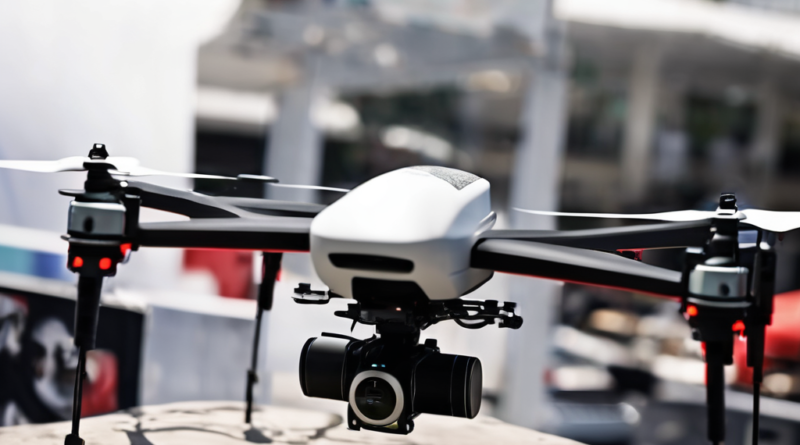Introduction to Drones in Professional Photography
Introduction to Drones in Professional Photography
In recent years, drones have revolutionized the world of photography. These flying marvels have opened up a new dimension in capturing stunning aerial shots that were once only possible with helicopters or cranes. Drones are not just for hobbyists; they have become an essential tool for professional photographers looking to expand their repertoire and deliver exceptional perspectives to their clients.
What Makes Drones Essential in Photography?
The advent of drone technology has brought about significant changes in how photographers approach their craft. Here are some reasons why drones have become indispensable in professional photography:
Unparalleled Aerial Views
Drones provide photographers with the ability to capture breathtaking aerial views that were previously inaccessible. Whether it’s a sweeping landscape, a bustling cityscape, or a serene beachfront, drones can capture it all from a bird’s-eye view, offering a unique perspective that adds depth and intrigue to any photo series.
Cost-Effective Solutions
Incorporating drones into professional photography is much more cost-effective than traditional aerial photography methods. Renting a helicopter or crane can be prohibitively expensive for many projects. Drones offer an affordable alternative without compromising on quality, making high-altitude shots accessible to photographers with various budgets.
Flexibility and Versatility
Drones can be used in a variety of photography styles and settings, from wedding shoots and real estate listings to news coverage and environmental studies. Their flexibility makes them an invaluable tool for photographers who need to adapt quickly to different shooting conditions.
Statistics and Trends in Drone Photography
According to a report by Goldman Sachs, the global drone market is expected to reach $100 billion by 2025, with a significant portion dedicated to commercial and professional uses. This boom is driven by the growing demand for advanced imaging solutions across industries.
Check Prices On Amazon
Choosing the Right Drone for Photography
When selecting a drone for professional photography, there are several factors to consider to ensure you make the best choice for your needs.
Camera Quality
The quality of the camera is paramount. Look for drones that offer high-resolution cameras, preferably with 4K video capabilities. Additionally, features like a gimbal for stabilization, adjustable aperture, and a wide dynamic range can significantly enhance the quality of your shots.
Flight Time and Battery Life
Longer flight times allow for more extensive shooting sessions and reduce the need for frequent battery changes. Most professional drones offer flight times ranging from 20 to 30 minutes per charge, with the option to carry spare batteries for extended shoots.
Ease of Use
For photographers new to drones, ease of use is an important consideration. Look for models with intuitive controls and features like GPS-assisted flight, obstacle avoidance, and automated flight modes to simplify the flying experience.
Best Practices for Drone Photography
To achieve stunning results with drone photography, consider these best practices:
Plan Your Shots
Before heading out for a shoot, plan your shots meticulously. Use mapping tools and location scouts to decide on the best vantage points and angles. This will help you maximize your drone’s battery life and ensure you capture the most compelling images.
Understand Local Regulations
Drone photography is subject to regulations that vary by country and region. Familiarize yourself with local laws regarding drone usage, including restricted areas, altitude limits, and the requirement for special permits or licenses.
Practice Safe Flying
Safety should always be a priority. Avoid flying in adverse weather conditions, maintain a line of sight with your drone, and be aware of your surroundings to prevent accidents and ensure the safety of people and property.
Applications of Drone Photography
Drones have found applications in various fields, each benefiting from their unique capabilities.
Real Estate
Drones offer real estate photographers the ability to showcase properties in their entirety, highlighting features like expansive gardens, proximity to amenities, and the surrounding landscape. Aerial images and videos can significantly enhance property listings, attracting potential buyers.
Wedding Photography
Drones add a magical touch to wedding photography, capturing sweeping shots of the venue, the bridal party, and guests. These aerial perspectives offer couples a unique keepsake of their special day.
Environmental and Wildlife Photography
For environmental and wildlife photographers, drones provide an unobtrusive way to capture images without disturbing the natural habitat. They enable photographers to document vast landscapes and elusive wildlife, contributing to conservation efforts and raising awareness.
Conclusion: The Future of Drone Photography
As technology continues to evolve, the potential for drones in professional photography is limitless. With advancements in AI, automation, and camera technology, drones are set to become even more integral to the photography industry. By embracing this technology, photographers can push the boundaries of their creativity and deliver breathtaking imagery that captivates audiences.
Whether you’re a seasoned professional or a budding photographer eager to explore new horizons, incorporating drones into your photography toolkit can transform your work and offer unparalleled opportunities for growth and innovation.

